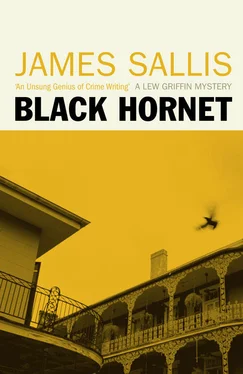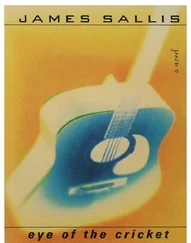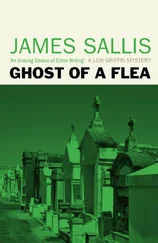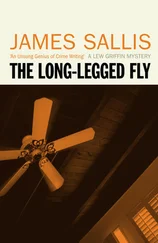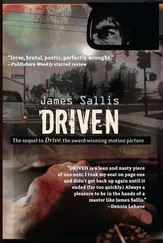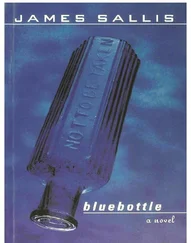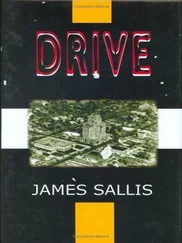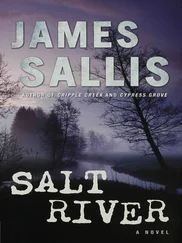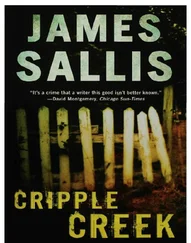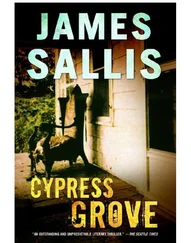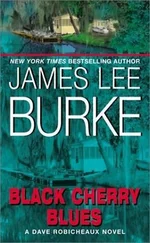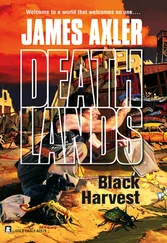James Sallis - Black Hornet
Здесь есть возможность читать онлайн «James Sallis - Black Hornet» весь текст электронной книги совершенно бесплатно (целиком полную версию без сокращений). В некоторых случаях можно слушать аудио, скачать через торрент в формате fb2 и присутствует краткое содержание. Жанр: Криминальный детектив, на английском языке. Описание произведения, (предисловие) а так же отзывы посетителей доступны на портале библиотеки ЛибКат.
- Название:Black Hornet
- Автор:
- Жанр:
- Год:неизвестен
- ISBN:нет данных
- Рейтинг книги:4 / 5. Голосов: 1
-
Избранное:Добавить в избранное
- Отзывы:
-
Ваша оценка:
- 80
- 1
- 2
- 3
- 4
- 5
Black Hornet: краткое содержание, описание и аннотация
Предлагаем к чтению аннотацию, описание, краткое содержание или предисловие (зависит от того, что написал сам автор книги «Black Hornet»). Если вы не нашли необходимую информацию о книге — напишите в комментариях, мы постараемся отыскать её.
Black Hornet — читать онлайн бесплатно полную книгу (весь текст) целиком
Ниже представлен текст книги, разбитый по страницам. Система сохранения места последней прочитанной страницы, позволяет с удобством читать онлайн бесплатно книгу «Black Hornet», без необходимости каждый раз заново искать на чём Вы остановились. Поставьте закладку, и сможете в любой момент перейти на страницу, на которой закончили чтение.
Интервал:
Закладка:
James Sallis
Black Hornet
Chapter One
Back in basic, which turned out to be fully a fifth of my military career, there was a guy named Robert, a gangly young man from Detroit so black he seemed polished. We were all out on the range one afternoon. They’d hauled an old World War II tank out there, and we were supposed to step up to the line, assemble a molotov cocktail and lob it into the tank through the open hatch. My own toss, most of our tosses, missed pretty sadly. Then Robert toed up there. He stood a few seconds looking off at the tank and hefting the bottle, getting the weight of it. Then with an easy overhand, he dropped his cocktail squarely into the tank: just like a man walking through a door. His perpetual smile jacked up a half degree, no more. “Sort of thing come in handy back home,” he said.
I remembered that, I think for the first time since it happened, when I read about the sniper.
His name was Terence Gully and he was twenty-three. He’d been in the Navy, but things hadn’t gone well for him there. Discrimination, he told friends, ex-employers, would-be employers, people on the streetcar or at bus stops. So at eleven A.M. on a bright fall day Gully had lugged a.44-caliber Magnum rifle and a duffel bag full of ammunition up an old fire escape onto the roof of The King’s Inn motel half a mile from City Hall, taken up position in a concrete cubicle there, and opened fire. Tourists and office workers on lunch break started going down before anyone knew what was happening. A Nebraska couple staying at the motel on their honeymoon, returning from breakfast. A couple of motel employees. A police officer who’d heard the first shots and rushed over from City Hall.
Hours later, bodycount mounting (bodycount being a term we were getting used to hearing in those years, grace a LBJ and General Westmoreland), they brought in a Seaknight chopper from the naval air base at Belle Chase. As they flew in low over the roof preparing to open fire, the pilot and police heard Gully ranting below them: “Power to the people…. You’ll never take me…. Africa! Africa!”
The pilot would later distinguish himself in Vietnam and return home, Purple Heart and Medal of Honor prominently displayed behind his desk, to a Ford dealership out in burgeoning Metairie, where mostly he sat in his glassed-in office and steadily poured Scotch into his coffee, himself a kind of exhibit now, as customers and their children ranged through the showroom beyond. One of the officers aloft with him that day, Robert Morones, would go on to become the city’s youngest chief of police and eventually settle into the easy chair of perennial reelection to his seat in the state legislature.
The siege lasted over twelve hours and left in its wake fifteen dead, thirty or more injured, untold damage both from diversionary fires Gully had set and from returned police gunfire.
The siege also left in its wake a badly shaken city. There had always been a silent accommodation here, a gentlemen’s agreement that blacks and whites would go on pursuing their parallel lives. But had the codes now changed? If one black man could carry his rage on his back onto a roof and from there hold hostage an entire city, if a group of black men (like those calling themselves Muslims) could recant their place in white man’s society, if still other groups and individuals (Black Panthers, The Black Hand) openly advocated taking up arms against that society-what remnants obtained of any agreement? Or, finally, of society itself.
The man who cut your yard Monday noon and shuffled feet when he came for his pay might come after your possessions and station, your livelihood, your very life, Tuesday night.
Made you think of the city under Spanish rule circa 1794, when Governor Carondelet, perched on the edge of a chair the French Revolution was busily pulling out from under European complacencies, mindful how quickly this sort of thing might spread, encircled the city with walls and forts, not to turn away attackers, but to help contain (he thought) its own French citizens.
Floors and makeshift shelves at Terence Gully’s Camp Street apartment were stacked with literature: pamphlets, flyers, tracts, hand-lettered posters. Over and over on the plasterboard walls Gully had scrawled peace signs, swastikas and slogans.
KILL THEM ALL!
BLACK IS RIGHT
HATE WHITE PEOPLE-BEASTS OF THE EARTH
The King’s Inn shootings were one parochial incident all but lost among a hundred others in those years of mounting violence. The first Kennedy had already gone down. The Watts riots were just around the corner. Memphis was waiting for Martin Luther King, L.A. for Robert Kennedy, a lectern in the Audubon Ballroom, Harlem, for Malcolm X. A month or so before, fifteen black men and women in Sunday best had staged a sit-in at City Hall’s basement cafeteria, where blacks weren’t served, and were dragged away by police. Three civil rights workers would be killed up in Mississippi just months later.
Looking back now, 1968 seems pretty much the hub year, a fulcrum. During the summer Olympics in Mexico City two American athletes were suspended for giving a black-power salute. The Tet Offensive also started up that year-along with bloody racial riots on the unreported back lots of Vietnam.
Not that I was much up on current events at the time. I had my hands full just getting to know my new home: how to get around in New Orleans, how to slide through the days here, how to clip off enough to survive, how to get by. When you’re young, history’s not worth much. When you get older, whether you consider it baggage or burden, history’s a large part of what you have. So a lot of this I learned, or relearned, later on.
Mostly what you lose with time, in memory, is the specificity of things, their exact sequence. It all runs together, becomes a watery soup. Portmanteau days, imploded years. Like a bad actor, memory always goes for effect, abjuring motivation, consistency, good sense.
So I couldn’t have told you then, even with a knife at my throat (were you, for instance, some singular historical mugger intent upon relieving passersby of their lives’ spare change), what year Vietnam got under way, when either Kennedy went down, what the Watts riots were really about.
Now I know.
But even then there were things you couldn’t help knowing. You’d turn on the radio while shaving and between songs hear about men whose faces had been torn off. Drop by Alton’s Barbershop, he’d snap the cloth around in front of you, and just for a minute, as both your eyes went to his big black-and-white set on a shelf above the cash register, the weight of the world would settle on you. The sky would fall. You’d feel your feet sink a little deeper into the ground.
And in New Orleans those days you couldn’t get away from talk of the sniper. Wherever you went, whoever was talking, that was the subject. Like weather, it was everywhere.
Then someone stopped talking about it and started doing something.
Monday morning, mid-November. A young man walking along Poydras on his way between the parking space he rented by the month and his job at Whitney National fell as he started across Baronne and lay dying against the curb. He was wearing a suit, he was white, and he had been shot, once, through the chest. Police sealed off and searched the area to no avail.
Wednesday, again downtown, on Carondelet a block from Canal, another fell, an off-duty bus driver. By-standers this time reported hearing shots spaced perhaps six seconds apart (investigators counted it out for them, to be sure), and said that the shots came from high up. A roof perhaps. Or one of the upper windows in this sole canyonlike stretch of the city. The bus driver had been struck first in the middle of his forehead, then squarely in the chest, through the sternum just above the ziphoid process.
Читать дальшеИнтервал:
Закладка:
Похожие книги на «Black Hornet»
Представляем Вашему вниманию похожие книги на «Black Hornet» списком для выбора. Мы отобрали схожую по названию и смыслу литературу в надежде предоставить читателям больше вариантов отыскать новые, интересные, ещё непрочитанные произведения.
Обсуждение, отзывы о книге «Black Hornet» и просто собственные мнения читателей. Оставьте ваши комментарии, напишите, что Вы думаете о произведении, его смысле или главных героях. Укажите что конкретно понравилось, а что нет, и почему Вы так считаете.
